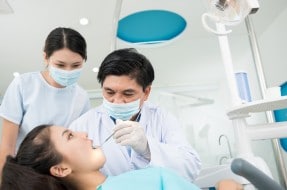Call now on0800 051 8069
Mouth Cancer and your Dentist
-
How can your dentist help to diagnose mouth cancer and the importance of early diagnosis?
When I think of cancer, mouth cancer and my dentist don’t immediately come to the forefront of my mind. I think about wearing pink and running thousands of meters to raise money for breast cancer or male friends growing moustaches for ‘Movember’.
But after dealing with a clinical negligence case recently involving an oral tumour, I realised that cancer can actually occur anywhere in the body and at any time and that mouth cancer affects a huge number of people every year.
What can cause Mouth Cancer?
I read on the British Dental Health Foundation’s website recently that each year in the UK alone there are over 6,000 cases reported of mouth cancer. It occurs when cells are prompted to grow uncontrollably as a result of something interrupting it’s normal lifecycle.
Many things can contribute or cause mouth cancer, including the usual known suspects, alcohol and smoking, because they contain chemicals which can damage our cells’ DNA and that change can then lead to mouth cancer.
It is therefore always vitally important to have regular dental check ups, but even more so if you are a smoker or have a high intake of alcohol.
But there are other things which can also trigger the development of cancer, such as the Human Papilloma Virus (HPV), the same virus that causes genital warts.
Symptoms of Mouth cancer
Symptoms of any cancer can be unique to the person suffering with the illness. Common symptoms in mouth cancer however include:
– lumps in the mouth
– ulcers that continually reoccur or do not heal properly
– patches of red or white in the mouth.
Other symptoms however can include pain, difficulty moving your jaw or swallowing, bleeding in the mouth or teeth that become loose for no apparent reason.
How can your dentist help?
As mouth cancer can affect any part of the lips, cheeks, tongue or throat, your dentist has an ideal opportunity during a check-up to spot any changes that may raise suspicions as to the development of mouth cancer. It is therefore another vital reason why regular dental check ups need to take place.
During a routine dental visit, your dentist will examine the whole of the inside of your mouth. If he/she notices anything suspicious then they will be able to refer you for further investigation immediately.
Your dentist has access to parts of your mouth that you cannot routinely see yourself and as early detection of mouth cancer is crucial, it is important that your dentist is given regular opportunities to ensure you are not at risk.
British Dental Health Foundation also report that some 1,800 people die from mouth cancer each year and that many of these deaths could have been prevented if the cancer was caught early enough. It is therefore vital that dentists are alert to the signs and symptoms of mouth cancer and make appropriate referrals if anything suspicious is identified to ensure the best prognosis for their patient. In some circumstances, failing to notice symptoms of mouth cancer can amount to negligence.
Is your dentist examining you correctly?
If you have been diagnosed with mouth cancer and are concerned that your dentist could have done more to spot this earlier and that you may have a worse prognosis as a result of any delay, please get in touch with me or one of my colleagues to discuss how we may be able to help you to investigate this further.







